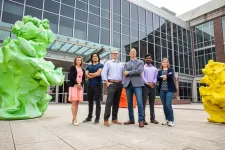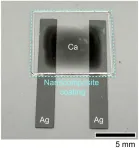(Press-News.org) Researchers at the University of São Paulo (USP) in Brazil, partnering with Foresee Pharmaceuticals, a Taiwan and US-based biopharmaceutical company, have tested a synthetic molecule for the treatment of heart failure. The study, funded by FAPESP, was published yesterday (11/07/2023) in the European Heart Journal. The theme was also highlighted in the magazine's editorial.
Heart failure is a condition in which the heart muscle cannot pump enough blood to meet the body's needs for blood and oxygen. It causes more deaths worldwide than any other disease, in the sense that other cardiovascular disorders tend to lead to heart failure, which affects over 2 million people in Brazil. A number of drugs can slow its progression but currently no treatment exists that can reverse it even partially. A heart transplant is considered if the condition becomes severe.
In the translational study conducted at USP, several experiments were conducted to demonstrate the effect of the molecule, named AD-9308, to restore the activity of the enzyme aldehyde dehydrogenase 2 (ALDH2), which is present in mitochondria (the organelles that generate energy to power cells’ biochemical reactions) and plays a key role in heart failure.
“The study lasted more than ten years and included both laboratory experiments and samples from heart failure patients with the aim of understanding a novel mechanism involved in heart failure progression. In parallel with our experiments, the biopharmaceutical company worked on improving the efficacy of a molecule described back in 2014, which has potential to treat cardiac diseases,” said Julio Cesar Batista Ferreira, corresponding author of the article and a professor at the Institute of Biomedical Sciences (ICB-USP).
The molecule prototype compound first described was named Alda-1. At the time, the researchers found that the drug compound increased heart function by 40% in rats with heart failure and that this effect was due to activation of ALDH2 in cardiac cells (more at: https://agencia.fapesp.br/19463).
Structural modifications were made to the original molecule to boost its pharmacological properties and qualify it as a potential development compound. After many versions iterations and tests, the scientists at Foresee Pharmaceuticals developed the AD-9308. “This new version activates the enzyme ALDH2 three times more than the original molecule,” Ferreira said.
The biopharmaceutical firm has completed clinical trials of another molecule similar to AD-9308, assuring its safety. “The results show that the synthetic molecule is well tolerated by healthy subjects. These are the required steps to apply to the FDA for permission to test the drug in heart failure patients. However, it requires more volunteers and more time, but it’s the only way to find out which kind of heart failure it could treat and at what stage of the disease,” he explained. The FDA is the United States Food and Drug Administration, responsible for protecting public health by assuring the safety and efficacy of human and veterinary drugs, among other duties.
Mitochondrial malfunction
Several studies conducted at ICB-USP in the past ten years have shown that heart failure is associated with mitochondrial malfunction. Like a car engine, mitochondria convert chemical energy into mechanical energy, which the heart needs to pump blood. “When a car engine isn’t running properly, energy conversion is impaired, efficiency drops, and pollution increases,” Ferreira said.
The “pollutant” produced by mitochondria in people with heart failure is 4-hydroxynonenal, a compound belonging to the class of aldehydes. “Every cell has hundreds or sometimes thousands of mitochondria, which produce enough aldehyde to poison the entire cell when they aren’t running properly. We discovered in this latest study that too much of 4-hydroxynonenal switches off a vital event for the cell: processing of microRNAs [small non-coding RNAs that regulate the activity of other genes],” he said.
Using mass spectrometry, the researchers observed that 4-hydroxynonenal [the aldehyde produced by mitochondria] binds irreversibly to Dicer [a protein essential to microRNA formation] and inactivates it. “In addition, we showed that AD-9308 improves mitochondrial filtration enough to eliminate this cellular pollutant,” he said.
Animals genetically engineered to lack Dicer are known to develop heart failure. “In this study, we identified the chemical alterations that inactivate Dicer in rodents and humans owing to the accumulation of aldehyde caused by heart failure. This was a hitherto unknown mechanism. The point is that Dicer is a limiting enzyme for formation and maturation of the microRNAs responsible for overall control of cellular biology,” he said. Interruption of microRNA formation and maturation is associated with several health problems, including cancer, metabolic syndrome, neurodegenerative disorders, and cardiovascular disease.
In experiments involving animals, cell cultures and heart tissue samples from the Heart Institute (Incor) at Hospital das Clínicas, the hospital complex run by the university’s Medical School (FM-USP), the researchers found that aldehyde binding makes Dicer stop working and reduces the amount of microRNAs available to the heart.
In addition to their discovery of this novel mechanism associated with heart failure, the researchers showed in samples of human heart tissue that the disorder can be reversed, and Dicer activity restored using the drug AD-9308.
“In summary, AD-9308 stimulates the removal of aldehyde from sick cells, reducing the likelihood that it will ‘switch off’ Dicer and hence protecting the heart cells. This tends to keep the microRNA profile closer to that of a healthy heart. I consider our partnership with Foresee Pharmaceuticals a success. It's been essential to our multidisciplinary multicenter research and development, producing highly promising results that can now be trialed in patients,” Ferreira said.
About São Paulo Research Foundation (FAPESP)
The São Paulo Research Foundation (FAPESP) is a public institution with the mission of supporting scientific research in all fields of knowledge by awarding scholarships, fellowships and grants to investigators linked with higher education and research institutions in the State of São Paulo, Brazil. FAPESP is aware that the very best research can only be done by working with the best researchers internationally. Therefore, it has established partnerships with funding agencies, higher education, private companies, and research organizations in other countries known for the quality of their research and has been encouraging scientists funded by its grants to further develop their international collaboration. You can learn more about FAPESP at www.fapesp.br/en and visit FAPESP news agency at www.agencia.fapesp.br/en to keep updated with the latest scientific breakthroughs FAPESP helps achieve through its many programs, awards and research centers. You may also subscribe to FAPESP news agency at http://agencia.fapesp.br/subscribe.
END
Molecule tested at University of São Paulo, in Brazil, proves able to mitigate heart failure
Results of trials involving animals, cell cultures and human heart tissue are reported in the European Heart Journal. The study was conducted by researchers at USP in partnership with a biopharmaceutical firm.
2023-11-08
ELSE PRESS RELEASES FROM THIS DATE:
How mice choose to eat or to drink
2023-11-08
Making decisions is hard. Even when we know what we want, our choice often leaves something else on the table. For a hungry mouse, every morsel counts. But what if the decision is more consequential than choosing between crumbs and cheese?
Stanford researchers investigated how mice resolve conflicts between basic needs in a study published in Nature on Nov. 8. They presented mice that were both hungry and thirsty with equal access to food and water and watched to see what happened next.
The behavior of the mice surprised the scientists. Some gravitated first ...
Plant lifecycle insights: Big data can predict climate change impact
2023-11-08
The study is based on a new database created by the researchers which combines, for the first time, datasets on distribution and datasets on lifecycles, making it possible to establish the prevalence of different lifecycles around the globe. It uses empirical tools and big data to examine theoretical paradigms about the way in which human disturbance is affecting annual plants and their global distribution. Among other things, it was found that annuals are expected to benefit more with the rise in human population density and due to climate change, which ...
Scientists one step closer to re-writing world’s first synthetic yeast genome, unravelling the fundamental building blocks of life
2023-11-08
Scientists have engineered a chromosome entirely from scratch that will contribute to the production of the world’s first synthetic yeast.
Researchers in the Manchester Institute of Biotechnology (MIB) at The University of Manchester have created the tRNA Neochromosome – a chromosome that is new to nature.
It forms part of a wider project (Sc2.0) that has now successfully synthesised all 16 native chromosomes in Saccharomyces cerevisiae, common baker’s yeast, and aims to combine ...
Scientists take major step towards completing the world’s first synthetic yeast.
2023-11-08
A UK-based team of Scientists, led by experts from the University of Nottingham and Imperial College London, have completed construction of a synthetic chromosome as part of a major international project to build the world’s first synthetic yeast genome.
The work, which is published in Cell Genomics, represents completion of one of the 16 chromosomes of the yeast genome by the UK team, which is part of the biggest project ever in synthetic biology; the international synthetic yeast genome collaboration.
The collaboration, known as 'Sc2.0' has been a 15-year project involving teams from around the world (UK, US, China, Singapore, UK, France and Australia), working together ...
New antifungal molecule kills fungi without toxicity in human cells, mice
2023-11-08
CHAMPAIGN, Ill. — A new antifungal molecule, devised by tweaking the structure of prominent antifungal drug Amphotericin B, has the potential to harness the drug’s power against fungal infections while doing away with its toxicity, researchers at the University of Illinois Urbana-Champaign and collaborators at the University of Wisconsin-Madison report in the journal Nature.
Amphotericin B, a naturally occurring small molecule produced by bacteria, is a drug used as a last resort to treat fungal infections. While AmB excels at killing fungi, it is reserved ...
Cellular “atlas” built to guide precision medicine treatment of rheumatoid arthritis
2023-11-08
Research consortium investigators analyzed over 314,000 cells from rheumatoid arthritis tissue, defining six types of inflammation involving diverse cell types and disease pathways
Understanding the disease at single-cell level may advance targeted drug development and treatment strategies
Rheumatoid arthritis (RA) is an autoimmune disease characterized by inflammation that leads to pain, joint damage, and disability, which affects approximately 18 million people worldwide. While RA therapies targeted to specific inflammatory pathways have emerged, only some patients’ symptoms improve with treatment, emphasizing the need for multiple ...
Estimated effectiveness of co-administration of the Pfizer-BioNTech COVID-19 vaccine with influenza vaccine
2023-11-08
About The Study: In this study that included 3.4 million adults, co-administration of the BNT162b2 BA.4/5 bivalent mRNA COVID-19 vaccine (Pfizer-BioNTech) and seasonal influenza vaccine was associated with generally similar effectiveness in the community setting against COVID-19–related and seasonal influenza vaccine-related outcomes compared with giving each vaccine alone and may help improve uptake of both vaccines.
Authors: Leah J. McGrath, Ph.D., of Pfizer Inc., in New York, is the corresponding author.
To ...
Age at diagnosis of atrial fibrillation and incident dementia
2023-11-08
About The Study: Earlier onset of atrial fibrillation was associated with an elevated risk of subsequent all-cause dementia, Alzheimer disease, and vascular dementia in this study including 433,000 UK Biobank participants, highlighting the importance of monitoring cognitive function among patients with atrial fibrillation, especially those younger than 65 years at diagnosis.
Authors: Fanfan Zheng, Ph.D., of the Chinese Academy of Medical Sciences & Peking Union Medical College in Beijing, and Wuxiang Xie, Ph.D., of the Peking University First ...
Physicists trap electrons in a 3D crystal for the first time
2023-11-08
Electrons move through a conducting material like commuters at the height of Manhattan rush hour. The charged particles may jostle and bump against each other, but for the most part they’re unconcerned with other electrons as they hurtle forward, each with their own energy.
But when a material’s electrons are trapped together, they can settle into the exact same energy state and start to behave as one. This collective, zombie-like state is what’s known in physics as an electronic “flat band,” and scientists predict that when electrons are in this state they can start to ...
Scaling up nano for sustainable manufacturing
2023-11-08
A new self-assembling nanosheet could radically accelerate the development of functional and sustainable nanomaterials for electronics, energy storage, health and safety, and more.
Developed by a team led by Lawrence Berkeley National Laboratory (Berkeley Lab), the new self-assembling nanosheet could significantly extend the shelf life of consumer products. And because the new material is recyclable, it could also enable a sustainable manufacturing approach that keeps single-use packaging and electronics out of landfills.
The ...
LAST 30 PRESS RELEASES:
New study finds earliest evidence of big land predators hunting plant-eaters
Newer groundwater associated with higher risk of Parkinson’s disease
New study identifies growth hormone receptor as possible target to improve lung cancer treatment
Routine helps children adjust to school, but harsh parenting may undo benefits
IEEE honors Pitt’s Fang Peng with medal in power engineering
SwRI and the NPSS Consortium release new version of NPSS® software with improved functionality
Study identifies molecular cause of taste loss after COVID
Accounting for soil saturation enhances atmospheric river flood warnings
The research that got sick veterans treatment
Study finds that on-demand wage access boosts savings and financial engagement for low-wage workers
Antarctica has lost 10 times the size of Greater Los Angeles in ice over 30 years
Scared of spiders? The real horror story is a world without them
New study moves nanomedicine one step closer to better and safer drug delivery
Illinois team tests the costs, benefits of agrivoltaics across the Midwest
Highly stable self-rectifying memristor arrays: Enabling reliable neuromorphic computing via multi-state regulation
Composite superionic electrolytes for pressure-less solid-state batteries achieved by continuously perpendicularly aligned 2D pathways
Exploring why some people may prefer alcohol over other rewards
How expectations about artificial sweeteners may affect their taste
Ultrasound AI receives FDA De Novo clearance for delivery date AI technology
Amino acid residue-driven nanoparticle targeting of protein cavities beyond size complementarity
New AI algorithm enables scientific monitoring of "blue tears"
Insufficient sleep among US adolescents across behavioral risk groups
Long COVID and recovery among US adults
Trends in poverty and birth outcomes in the US
Heterogeneity of treatment effects of GLP-1 RAs for weight loss in adults
Within-person association between daily screen use and sleep in youth
Low-dose lithium for mild cognitive impairment
Catheter ablation and oral anticoagulation for secondary stroke prevention in atrial fibrillation
A new theory of brain development
Pilot clinical trial suggests low dose lithium may slow verbal memory decline
[Press-News.org] Molecule tested at University of São Paulo, in Brazil, proves able to mitigate heart failureResults of trials involving animals, cell cultures and human heart tissue are reported in the European Heart Journal. The study was conducted by researchers at USP in partnership with a biopharmaceutical firm.



